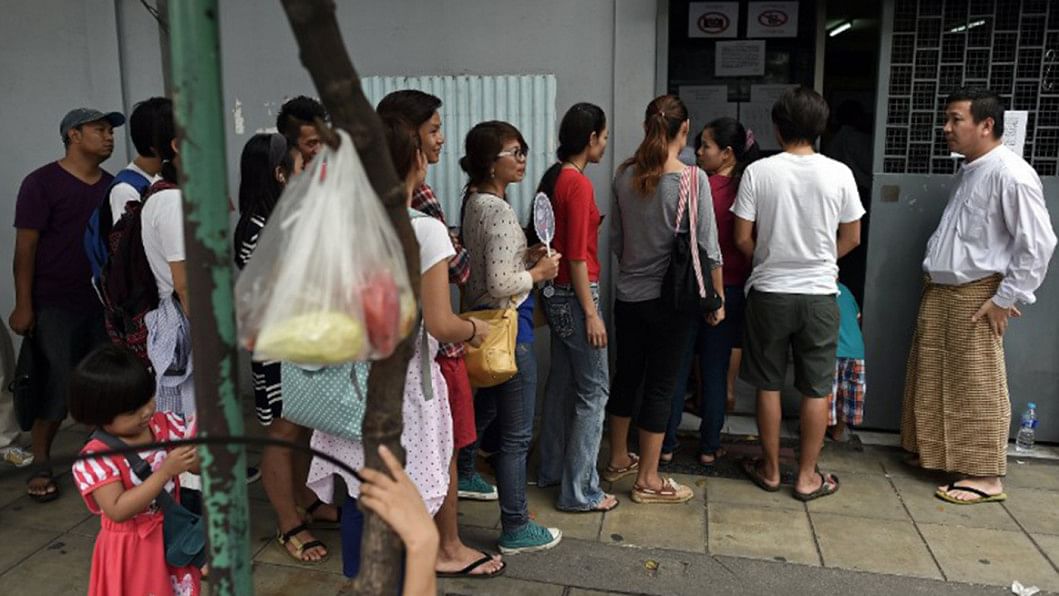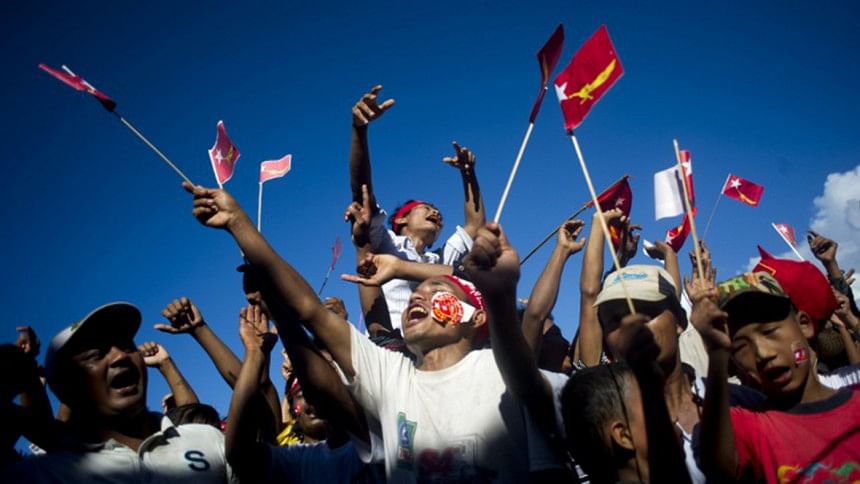Around four million voters kept out Myanmar election

-Around 4 million Myanmar citizens, won't be taking part in the election next month
-Most of them are working overseas and have been unable to register
-Voter lists riddled with errors and the cancellation of polling in areas affected by ethnic violence could also dent the credibility of the election
-The Nov. 8 general election is a major landmark in the reform of the former pariah state that began when a military junta ceded power to a quasi-civilian government in 2011
-Myanmar's ruling Union Solidarity and Development Party (USDP) is expected to be trounced by Aung San Suu Kyi's National League for Democracy (NLD)
-Chairman of the Union Election Commission (UEC), Tin Aye, summoned major political parties and suggested the vote should be postponed due to recent flooding
-Some 800,000 former "temporary citizens", many of them Muslim Rohingya have been disenfranchised
When Myanmar votes next month in what has been billed as its first free and fair election in 25 years, Tun Lin, and around 4 million of his fellow citizens, won't be taking part.
Most, like the 33-year-old fisherman, are working overseas and have been unable to register, but voter lists riddled with errors and the cancellation of polling in areas affected by ethnic violence could also dent the credibility of the election.
"I think that the government is not doing what it needs to do to make sure that all Burmese citizens are able to vote everywhere they are," said Phil Robertson, deputy director of Human Rights Watch's Asia division.
"These people are largely going to be disenfranchised because the system doesn't encourage their participation." Robertson added.
The Nov. 8 general election is a major landmark in the reform of the former pariah state that began when a military junta ceded power to a quasi-civilian government in 2011.
Myanmar's ruling Union Solidarity and Development Party (USDP) is expected to be trounced by Aung San Suu Kyi's National League for Democracy (NLD) - whose landslide victory in a 1990 election was ignored by the junta.
In the Thai fishing port of Mahachai, 45 km (30 miles) southwest of Bangkok, many of the near 300,000-strong Myanmar migrant workforce complain of scant or confusing information that prevented them registering to vote.
Myanmar government representatives did not visit the town to tell people they could vote and many workers did not realise they could not use their temporary passports as identification when they travelled to Bangkok to vote last weekend, rights organizations said.
Many workers in Mahachai fled Myanmar after a crackdown on pro-democracy protesters in 1988, others migrated later to earn a better living in Thailand.
Thousands welcomed Suu Kyi when she visited Mahachai in 2012 during her first trip abroad in 24 years.
"They don't care about us because they are afraid the NLD party will win so it's kind of like a prevention to stop us from voting," said Tun Lin, who lost his right hand in an accident on a Thai trawler off Indonesia.
Only around 34,000 out of more than 2 million officially registered Myanmar workers living overseas managed to register to vote in time, according to the government.
POSTPONEMENT THAT WASN'T
After nearly half a century under military rule, the former Burma has little experience organising elections.
The army remains powerful, guaranteed a quarter of the seats in parliament and wielding a veto over constitutional change.
Last week, the chairman of the Union Election Commission (UEC), Tin Aye, a former general and ally of President Thein Sein, summoned major political parties and suggested the vote should be postponed due to recent flooding in some areas.
The move came without warning, even to senior election commission officials, shocking opposition parties who viewed the proposed delay as a tactic by the ruling camp to influence the outcome of the vote.
Media uproar ensued, accompanied by a blizzard of phone calls among worried diplomats gathered in the capital Naypyitaw before the commission made swift U-turn, announcing the vote would go ahead as scheduled.
The incident may simply have been the result of poor organisation, but highlighted a lack of transparency that makes the system vulnerable to charges of government interference.

MISSING VOTERS
Thousands of people in the areas worst affected by flooding will likely be unable to vote, but they will form only a small portion of the total number who cannot cast their ballot.
Election commission spokesman Thein Oo acknowledged there were problems and said the commission was working to fix them.
He said it was impossible to estimate how many people would not be able to vote.
Observers agree a definitive number is not possible, but some estimate it at around 4 million people. This is more than 10 percent of 33.5 million people officially eligible to vote.
Some 800,000 former "temporary citizens", many of them Muslim Rohingya have been disenfranchised.
Between 100-500,000 people in isolated ethnic areas or internal migrant workers, such as those in slums in Yangon are also not registered, Human Rights Watch estimates.
The numbers of internally displaced persons who cannot vote is in the tens of thousands. In addition, 110,000 refugees in nine camps along the Thai-Myanmar border won't vote.
Many of the estimated 3 million migrant workers in Thailand have not registered, along with scores of people in Malaysia and Singapore, the organization said.
The election commission has also ditched plans for voting to take place in areas affected by ethnic violence - even in places controlled by groups that agreed to a ceasefire.
"We won't have enough time to create voter lists and carry out necessary preparations," said Thein Oo, adding voting may take place in those areas once the situation stabilises.
Nationwide, monitors and opposition parties say electoral rolls are ridden with errors and many names are missing.
"It's impossible for the election to be free and fair because there are so many mistakes on voter lists," said Sai Aik Paung, who heads the Shan Nationalities Democratic Party. "That's a great problem."

 For all latest news, follow The Daily Star's Google News channel.
For all latest news, follow The Daily Star's Google News channel. 



Comments